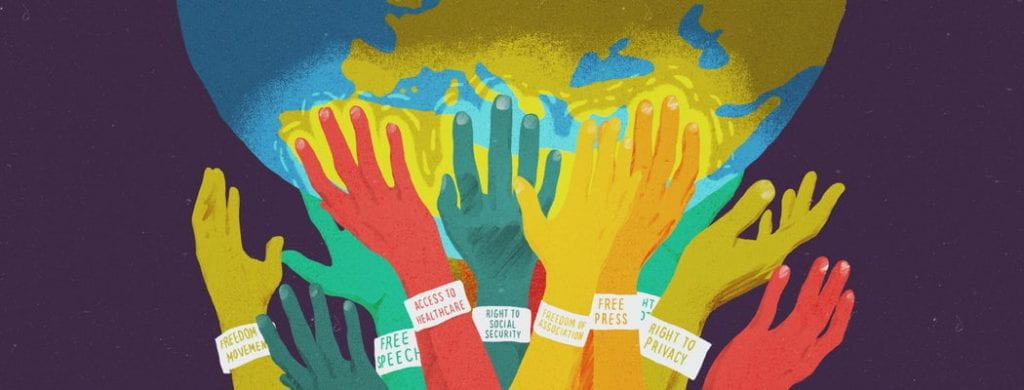
In the midst of a pandemic and international unrest, it is vital to stay encouraged and optimistic as we continue our efforts to uphold and protect human rights internationally. That is why we at the Institute for Human Rights at UAB will be using this article to break up the negative news cycle and put a spotlight on a few of the amazing victories and progress the international community has made during the pandemic that you might not have heard about. Though positive human rights news may not always make headlines, it is important to recognize each success, just as it is vital we address each issue.

The UN Declares Access to a Clean Environment is a Universal Human Right – July 2022
Of the 193 states in the United Nations general assembly, 161 voted in favor of a climate resolution that declares that access to a clean, healthy and sustainable environment is a universal human right; one that was not included in the original Universal Declaration of Human Rights in 1948. While the resolution is not legally binding, it is expected that it will hugely impact international human rights law in the future and strengthen international efforts to protect our environment. Climate justice is now synonymous with upholding human rights for the citizens of member-states, and the United Nations goal is that this decision will encourage nations to prioritize environmental programs moving forwards.
Kazakhstan and Papua New Guinea Abolish the Death Penalty- January 2022
Kazakhstan became the 109th country to remove the death penalty for all crimes, a major progress coming less than 20 years after life imprisonment was introduced within the country as an alternative punishment in 2004. In addition to the national abolition, President Kassym-Jomart Tokayev has signed the parliamentary ratification of the Second Optional Protocol to the International Covenant on Civil and Political Rights. Article 6 of the ICCPR declares that “no one shall be arbitrarily deprived of life”, but the Second Optional Protocol takes additional steps to hold countries accountable by banning the death penalty within their nation. Though the ICCPR has been ratified or acceded by 173 states, only 90 have elected to be internationally bound to the Second Optional Protocol (the total abolition of the death penalty), and Kazakhstan is the most recent nation to join the international movement to abolish the death penalty globally.
Papua New Guinea also abolished their capital punishment, attributing the abolishment to the Christian beliefs of their nation and inability to perform executions in a humane way. The 40 people on death row at the time of the abolishment have had their sentences commuted to life in prison without parole. Papua New Guinea is yet to sign or ratify the Second Optional Protocol to the ICCPR, but by eliminating the death penalty nationwide the country has still taken a significant step towards preserving their citizens right to life.

India Repeals Harmful Farm Plan – November 2021
Many of you will remember seeing international headlines of the violent protests following India’s decision to pass three harmful farming laws in 2020. The legislation, passed in the height of the pandemic, left small farmers extremely vulnerable and threatened the entire food chain of India. Among many other protections subject to elimination under the farm laws was the nations Minimum Support Price (MSP), which allowed farmers to sell their crops to government affiliated organizations for what policymakers determined to be the necessary minimum for them to support themselves from the harvest. Without the MSP, a choice few corporations would be able to place purchasing value of these crops at an unreasonably low price that would ruin the already meager profits small farmers glean from the staple crops, and families too far away from wholesalers would be unable to sell their crops at all.
Any threats to small farms in India are a major issue because, according to the Food and Agriculture Organization (FAO) of the United Nations, “Agriculture, with its allied sectors, is the largest source of livelihoods in India”. In addition, the FAO reported 70% of rural households depend on agriculture and 82% of farms in India are considered small; making these laws impact a significant amount of the nation’s population. A year of protests from farmers unions followed that resulted in 600 deaths and international outcries to protect farmers pushed the Indian government to meet with unions and discuss their demands. An enormous human rights victory followed as Prime Minister Narendra Modi announced in November of 2021 that they would rollback the laws, and on November 30 the Indian Parliament passed a bill to cancel the reforms. As the end of 2021 approached, farmers left the capital and returned home for the first time in months, having succeeded at protecting their families and their livelihoods.

Sudan Criminalizes Female Genital Mutilation – May 2020
Making history, Sudan became one of 28 African nations to criminalize female genital mutilation / Circumcision (FGM/C), an extremely dangerous practice that an estimated 200 million woman alive today have undergone. It is a multicultural practice that can be attributed to religion, sexual purity, social acceptance and misinformation about female hygiene that causes an onslaught of complications depending on the type of FGM/C performed and the conditions the operation is performed in. Among the consequences are infections, hemorrhage, chronic and severe pain, complications with childbirth, and immense psychological distress. It also causes many deaths from bleeding out during the operation or severe complications later in life. We have published a detailed article about female genital mutilations, gender inequality and the culture around FGM before, which you can find here.
FGM/C is a prevalent women’s rights issue in Africa, and in Sudan 87% of women between the ages of 14 and 49 have experienced some form of “the cut”. While some Sudanese states have previously passed FGM/C bans, they were ignored by the general population without enforcement from a unified, national legislature. This new ban will target those performing the operations with a punishment of up to three years in jail in the hopes of protecting young women from the health and social risks that come from a cultural norm of genital mutilation and circumcision.
Where do we go from here?
While we have many incredible victories to celebrate today, local and international human rights groups will continue to expose injustices and fight for a safer and more equal future for all people. Our goal at the Institute for Human Rights at UAB is to educate; to inform readers about injustices and how they can get involved, and to celebrate with our incredible community when we have good news to share! While the past year has been marked with incredible hardships, it is always exciting when we have heart-warming international progress to share!
You can find more information about us, including free speaker events and our Social Justice Cafes on our Instagram page @uab_ihr! Share which of these positive stories you found most interesting in our comments, and feel free to DM us with human rights news you would like us to cover!
